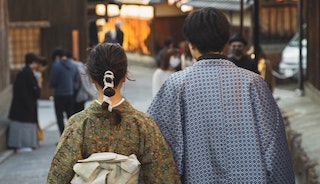Miyazaki, Apr 17 (News On Japan) - Miyakonojo City in Miyazaki Prefecture has introduced a new leave system called "grandchild leave," allowing grandparents to take up to seven days off to support childcare, in a move that reflects changing work and family dynamics.
The initiative began in April, and Mayor Noritaka Ikeda visited Haneda Airport on April 16th to promote the program. "From this April, we started implementing what we call 'grandchild leave' in Miyakonojo. It’s essentially a grandparent version of childcare leave," said Ikeda.
Previously, Miyakonojo already had a system in place that allowed male employees to take up to seven days off when their child is born—combining leave for birth support and participation in childcare. This system has now been extended to include grandparents, enabling them to also take time off under the new policy.
The program was introduced in response to modern work styles, where both parents are often employed. Ikeda said, "Many households have both parents working, and in such cases, support from grandparents can be a tremendous help for those raising children. I personally experienced this when my wife’s parents lived nearby—it made a big difference."
Within two weeks of the policy's implementation, three people had already taken advantage of it. Among them is 52-year-old Megumi Onizuka, who is using her grandchild leave in small increments to help care for her daughter’s newborn.
"It’s wonderful to be able to use special leave instead of paid vacation. Child-rearing isn’t something one can do alone, especially right after childbirth when help from others is essential. I really appreciate this system," said Onizuka, head of the city’s Philosophy Promotion Division.
Meanwhile, 60-year-old Katsutoshi Tashita took his first grandchild leave on April 18th to care for his nine-month-old granddaughter. "In nuclear families, mothers often have to take time off, and young children tend to get sick easily. In those situations, it’s a big help if grandparents can step in," said Tashita, a senior official in the Asset Tax Division.
According to those who have used the leave, the short duration and support from coworkers made it easy to take time off.
Miyagi Prefecture was the first prefectural government in Japan to introduce grandchild leave in 2023. The first employee to use it was the director of the Prefectural Assembly Secretariat. He had long been involved in policies related to childcare support and staff leave, and said the system helped deepen his awareness of childcare issues.
"Childcare support isn’t something only parents can handle. It requires involvement from a wide range of people. During my time off, I became more conscious of this, and my awareness grew," said Masanao Abe, the Secretariat’s director at the time.
Because it was the first such system introduced at a prefectural office, there was some criticism, with opponents questioning whether it was appropriate to offer paid leave for such purposes or to introduce a policy that no other region had adopted.
However, employees who used the leave expressed a desire for more days off, saying the current number is not enough.
In Miyakonojo, city officials say they have not received any negative feedback from residents and hope to continue promoting understanding of the initiative.
"If programs like this spread nationwide, I believe Japan’s overall support for child-rearing will improve," said Ikeda.
As Japan faces a declining birthrate and evolving work environments, promoting greater understanding and cooperation in child-rearing is becoming increasingly important.
Source: FNN















